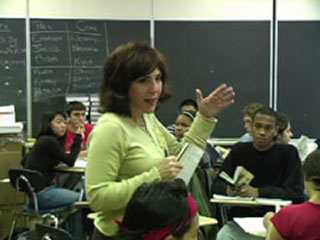Resources
Professional Networks:
I developed my approach to teaching through
two teacher networks: the Philadelphia
Writing Project and the Philadelphia
Young Playwrights' Festival. Through
PhilWP, and my work with that teacher network, I was introduced
to the idea of inquiry, both teacher inquiry and inquiry as a
stance in the classroom and inquiry as a way of engaging students.
Through the teacher network of the Philadelphia Young Playwrights,
I learned about the power of drama and playwriting. That involvement
with other teachers in these networks has given me access to
a nexus of teacher collaboration; they came
together just in really powerful ways in my classroom when I
started teaching playwriting. But
at Masterman, because I have to do them in separate contexts,
the drama and English—there are ways in which what I learned
in the nexus of drama and inquiry informs some of my practices
in teaching English. Particularly in teaching Shakespeare!
Professional Reading:
Some of the activities documented in this
website are drawn from Shakespeare
Alive, by Joseph Papp.
Cambridge
School Shakespeare is a series of Shakespeare plays
that have all sort of performance and drama ideas in that text
for teaching it. In each volume you have the text, but on
each page in addition to notes are suggestions for engaging students
in different kinds of language and performance tasks. I don’t
buy it for the class, but I have one for every Shakespeare play
that I teach. I like it because the British teach Shakespeare
differently. They know it’s
theater, so they teach it like theater. And drama education
is part of their K-12 curriculum. So any teaching resources
that came from England are often more performance-oriented than
American ones.
Other works that inform my teaching:
Boal, Augusto. Theatre of the Oppressed. New York: Theatre
Communications Group. 1985.
Doyle, Clar. Raising Curtains on Education: Drama as a Site
for Critical Pedagogy. Westport, CT: Bergin and Garvey.
1993.
Edmiston, Brian. “Drama as Ethical Education.” Research
in Drama Education. Volume.5. Number 1. February 2000. pp.
63-84.
Harris, L. and Worden, A. “How Pa. heartland went for gay
rights.” The Philadelphia Inquirer. Dec.15. 2002.
Iser, Wolfgang. The Act of Reading. (pp.53-85). Baltimore
and London: The johns Hopkins University Press. 1978.
Kaufman, Moises. “Into the West: An Exploration in Form.” American
Theater. Volume 17. Number 5. May/June 2000. pp. 20-23.
Kaufman, Moises. The Laramie Project. New York: Dramatist
Play Service, 2000.
Patterson, Nadine and Strosser, Marjorie. I Used to Teach
English. Philadelphia: Scribe Video. 1993.
Pincus, Marsha. Playing With the Possible: Teaching Learning
and Drama on the Second Stage. http://kml.carnegiefoundation.org/gallery/mpincus/ 2001.
Rosenblatt, Louise. Literature as Exploration.
fifth edition. New York: The Modern Language Association.
1995.
Wilhelm, Jeffrey and Edmiston, Brian. Imagining to Learn:
Inquiry Ethics and Integration Through Drama. Portsmouth,
NH: Heinemann. 1998.
